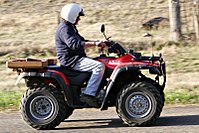
Photo from wikipedia
Abstract Recently developed granular scaling laws create new opportunities to evaluate particle dynamics between environment and wheel shapes. We investigate the performance of straight grousered (i.e. protrusions added to the… Click to show full abstract
Abstract Recently developed granular scaling laws create new opportunities to evaluate particle dynamics between environment and wheel shapes. We investigate the performance of straight grousered (i.e. protrusions added to the wheel rim to better engage the soil) wheels and helical grousered wheels in both silica sand and crushed basalt lunar simulant. Mechanical power draw and velocity of the wheels are compared in both materials for performance assessment. The scaling laws are evaluated for Earth gravity experimentally and reduced gravity through coupled multi-body dynamic and discrete element method (MBD-DEM) simulations. Experimental results show general power prediction error between 20 and 35% for crushed basalt and 15–25% error for silica sand. Velocity prediction error showed high dependence on material, with silica sand error generally between 4 and 10% and crushed basalt varied between 0 and 27%. Simulation results match theoretical predictions more closely with power error under 8% and velocity error under 4% for most speeds. The experimental error was further investigated and shows a new scaling dependency on sinkage (depth which the wheel rim sinks below the terrain surface) thresholds.
Journal Title: Powder Technology
Year Published: 2020
Link to full text (if available)
Share on Social Media: Sign Up to like & get
recommendations!